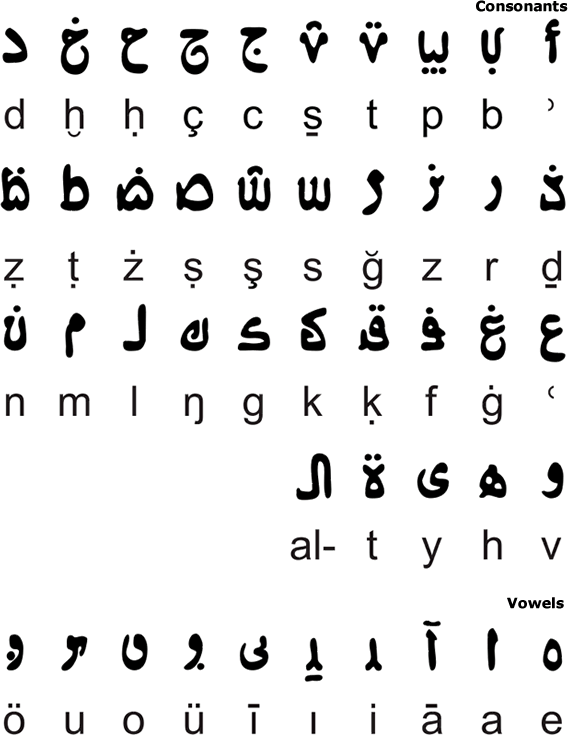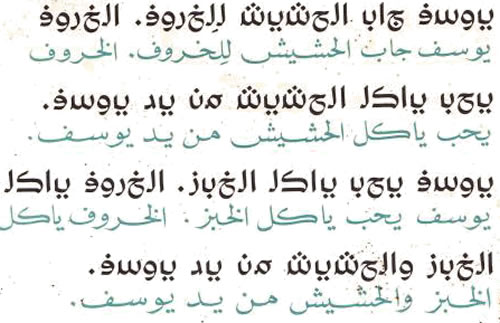Hurûf-ı munfasıla is an alternative way to write Ottoman Turkish that was created in 1914 by Enver Pasha (İsmâil Enver), an Ottoman Turkish military officer and revolutionary. He believed that the Otttoman Turkish alphabet was difficult to learn with its changing letter shapes and the absence of vowels. In his new alphabet, each letter is written separately, has only one form, and the vowels were all written, making it easier to learn. It also maintains links to the past, and would not affect the learning of the Quran too much.
Hurûf-ı munfasıla is also known hatt-ı cedîd, hatt-ı, Enver Paşa Alfabesi, Enverî, Enveriye, the Enver script, the Army Alphabet or the German script. The name Hurûf-ı munfasıla / حروف منفصله means "separate letters".
Enver Pasha published a book teaching his alphabet in 1917, and as Minister of War, he ordered his alphabet to be used for army correspondence, maps, regulations and other printed materials. Since it took more time and effort to write than the standard Ottoman Turkish alphabet, and texts in it took up a lot more space, it was not very well suited to use by the military, who needed to send messages quickly. It fell out of use after World War I.
The Latin alphabet was adapted and adopted for Turkish in 1928, and Enver Pasha's alphabet was largely forgotten.


Source:https://kabk.github.io/go-theses-23-hilal-mutluel/
This text shows the Hurûf-ı munfasıla in black, and the standard Ottoman Turkish alphabet below it.
Information about Turkish | Phrases | Numbers | Family words | Time | Tongue twisters | Tower of Babel | Hurûf-ı munfasıla | Books about Turkish on: Amazon.com and Amazon.co.uk [affilate links]
- TurkishClass101.com - Learn Turkish with Free Audio and Video Lessons
- Learn Turkish online with Mondly
- Learn Turkish with Glossika
Information about Hurûf-ı munfasıla
https://en.wikipedia.org/wiki/Hurûf-ı_munfasıla
https://yenidenergenekon.com/272-enver-pasa-alfabesi-huruf-i-munfasila/
https://saadetkapisi.blogspot.com/2012/04/enveri-harfler-yahut-huruf-i-munfasla.html
https://kabk.github.io/go-theses-23-hilal-mutluel/
A-chik Tokbirim, Adinkra, ADLaM, Armenian, Avestan, Avoiuli, Bactrian, Bassa (Vah), Beitha Kukju, Beria (Zaghawa), Borama / Gadabuursi, Carian, Carpathian Basin Rovas, Chinuk pipa, Chisoi, Coorgi-Cox, Coptic, Cyrillic, Dalecarlian runes, Elbasan, Etruscan, Faliscan, Fox, Galik, Georgian (Asomtavruli), Georgian (Nuskhuri), Georgian (Mkhedruli), Glagolitic, Global Alphabet, Gothic, Greek, Hurûf-ı munfasıla, Irish (Uncial), Kaddare, Kayah Li, Khatt-i-Badíʼ, Khazarian Rovas, Koch, Korean, Latin, Lepontic, Luo Lakeside Script, Lycian, Lydian, Manchu, Mandaic, Mandombe, Marsiliana, Medefaidrin, Messapic, Mongolian, Mro, Mundari Bani, Nag Chiki, Naasioi Otomaung, N'Ko, North Picene, Novo Tupi, Nyiakeng Puachue Hmong, Odùduwà, Ogham, Old Church Slavonic, Oirat Clear Script, Ol Chiki (Ol Cemet' / Santali), Old Italic, Old Nubian, Old Permic, Ol Onal, Orkhon, Osage, Oscan, Osmanya (Somali), Pau Cin Hau, Phrygian, Pollard script, Runic, Székely-Hungarian Rovás (Hungarian Runes), South Picene, Sutton SignWriting, Sunuwar, Tai Viet, Tangsa, Todhri, Toto, Umbrian, (Old) Uyghur, Wancho, Yezidi, Zoulai
Page created: 24.03.25. Last modified: 24.03.25
[top]
You can support this site by Buying Me A Coffee, and if you like what you see on this page, you can use the buttons below to share it with people you know.

If you like this site and find it useful, you can support it by making a donation via PayPal or Patreon, or by contributing in other ways. Omniglot is how I make my living.
Note: all links on this site to Amazon.com, Amazon.co.uk
and Amazon.fr
are affiliate links. This means I earn a commission if you click on any of them and buy something. So by clicking on these links you can help to support this site.
[top]